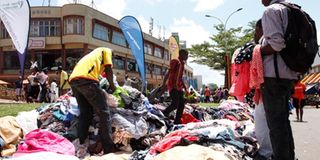Used clothes ban will be gradual, says government

Traders display secondhand clothes on one of the streets during the Kampala City Festival last year. Government has said the ban on secondhand clothes will be gradual. Photo by Rachel Mabala
What you need to know:
Initiative. Regional states had proposed a ban on the items to boost local industries.
Kampala. The importation of secondhand clothes will continue for some time despite calls from East African Legislative Assembly (Eala)and textiles industry players to have the imports banned almost immediately.
In a discussion with the Eala members on a range of topics, including updates on textile and leather industry, Trade minister Amelia Kyambadde said secondhand cloth business is here to stay for a while because of the demand it commands.
She told the Ugandan Eala legislators who paid her a visit last week in her office in Kampala, that despite the regional parliament proposal to ban used clothes, the reality on the ground is that majority of the population use them and for that they cannot be done away with just like that.
She said: “Uganda has decided to go slow on the ban on used clothes. The ban on secondhand clothes will be a gradual process as Uganda develops her textile and leather industries.”
She continued: “Secondhand clothes provide employment to many Ugandans. It is also affordable and readily available.”
Tax imposed
To begin with the limitation of the importation of used clothes, Ms Kyambadde said government has imposed an excise duty on secondhand clothes as the country continues to develop her textile industry.
Also, the National Textile Policy and the National Leather and Leather Products Policy which outline key interventions in the promotion of the two sub sectors is being implemented by the government with the view to promote and protect the local nascent industries from undue competition.
In addition, the Buy Uganda Build Uganda Policy (BUBU) was put in place to promote local products made in Uganda, including textile and leather products.
This will be enforced with a view to reducing reliance on imported products at the expense of locally produced goods.
Currently, Uganda has only three textile industries including Southern Range Nyanza Ltd, Phenix Logistics (U) Ltd and Fine Spinners Ltd, who according to the Trade ministry statement, cannot address the demand if secondhand clothes were to be completely banned.
In an earlier interview, it was evident that the Southern Range Nyanza, locally known as Nytil, one of the leading textile manufacturers in the country, wants the government to enforce the textile policy so as to save the local industry from undue competition emanating from imported clothes, particularly the secondhand clothes.
Statistics indicate that about 80 per cent of textile products consumed in the country are imported, with majority being mivumba - secondhand clothes.
“All we are asking for is a level playing field because we are here for a long term. We should be protected from cheap imported clothes. This impacts our production levels,” Nytil general manager Vinay Kumar said in an interview recently.
Other issues
Meanwhile Eala MPs are currently undertaking an outreach and sensitisation programme in the six partner states. Led by Ms Nusura Tiperu, they will be looking at understanding how deep is the integration across the six regional member states with their key areas of discussion being around the EAC Common Market Protocol, EAC Industrialisation agenda, cooperatives development, preparedness for the EAC-Comesa-SADC Tripartite and strategic interventions in improving the doing business environment.
Mr Mike Sebalu, the spokesperson of the team that visited Ms Kyambadde, said they are in Uganda to follow up on implementation of key issues such as those raised in the 2016/2017 Budget including the Common External Tariff, Rules of Origin, the EAC sensitive list, the upcoming EAC Competition Authority and Uganda’s preparation for the EAC-Comesa-SADC Tripartite arrangement.




